Blessings in Small Packages
Choosing life and ministry in a small town
by Diane J. McDougall
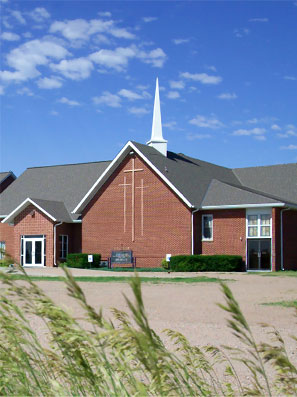
Holcomb EFC, Holdrege, Neb.
(Photo: Dawn Hetrick)
rom sea to shining sea, America’s small-town church landscape is dotted with spires, stained glass and ancient pews, as well as brand-new additions and sophisticated sound systems. But it’s not America’s buildings that are her greatest strength. It’s her people.
Life in rural America and in her small towns is different from life in her cities and suburban centers. When daily living has historically been tied to the land, your values reflect that—even if family farms are now a thing of the past.
True, “small town” doesn’t always equal “small church,” nor is the reverse always true. Yet often the two qualities overlap. Despite the fact that 36 percent of EFCA congregations attract fewer than 100 people on a typical weekend*, many of us misunderstand and underappreciate rural and small-town churches.
What some Christian leaders view as ministry “challenges” are regarded as blessings, unique strengths of ministry in rural areas and small towns.
There is no local news that doesn't directly affect our people. So compassion ministries come more naturally.
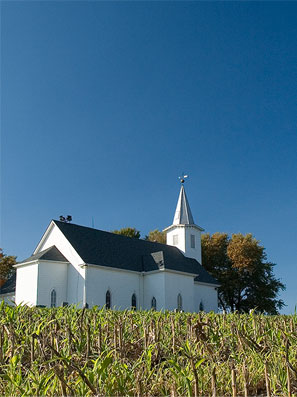
St. Luke EFC, Wellington, Mo.
(Photo: Don Fuhr)
Extended
Families
The stereotype is true: Everyone in a small church just might be related. “If you want to get married, you have to go out of town to find a spouse,” jokes one small-town pastor.
“If you can keep track of who is related to whom, and make no faux-pas,” adds Judy Brower, director of women’s ministry at Riverview Community Church in Ashland, Neb., “then the fact that one person is reached with the gospel could very well mean that their whole clan will be.”
And if the extended family loves Jesus, it’s an even more powerful network. “A teenager might think that Mom and Dad are out to lunch,” says Karin Taylor, missions and outreach coordinator at Santa Margarita (Calif.) Community Church, “but it is harder to write off multiple generations, especially when you’ve grown up seeing their faith lived out day-to-day.”
Being related to everyone has its downsides too. Tightly connected church members can forget to reach out to newcomers. “And there are a few young adults who might not want to be part of small groups with their parents or parents’ friends—but that doesn’t leave anyone else,” laughs Robert Campbell, pastor of Santa Margarita Community Church.
The commitment to family in a small community also means a commitment to every baseball game, every 4-H show, everything on everybody’s calendar. Without a doubt, time is the most precious commodity in rural and small-town churches. Just as with their larger city cousins.
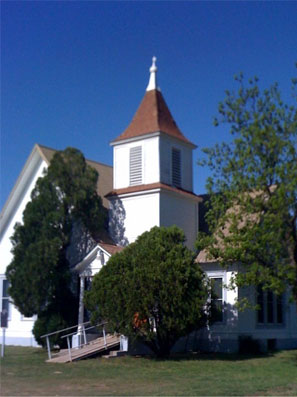
Melvin EFC, Melvin, Texas
(Photo courtesy: Mark Nygard)
Bivocational
Ministry
In small congregations, pastors and their wives often take second jobs, just like their parishioners. Larry Evans remembers how part-time substitute teaching was the only way to make ends meet in 1994 when he responded to the call to Neal (Kan.) EFC—10 miles from the closest town.
“Frankly, it meant that sometimes, on Saturday nights, I was so tired I could barely put a sermon together,” he admits. “But substitute teaching was a powerful way to establish loving pathways into the community and into the hearts of kids.”
Then there’s Mark Nygard (who might truthfully be called trivocational). When he started pastoring Yegua Creek EFC in Elgin, Texas—on the land his great grandfather donated in 1908 to build the original church—he worked on the side as a cattle-brand inspector and cattle rancher. Then in 2001 he began traveling 175 miles, twice a month, to pastor Melvin EFC.
Although neither church is large (Yegua Creek, 150; Melvin EFC, 20), they are growing each year. “My life is integrated into the members’ lives,” Mark says. “I have also mentored countless people at the cattle auctions. They don’t go to church, but in a sense I am their pastor.
“I’m to the point now where I don’t have to be bivocational. Rather I choose to be bivocational.”
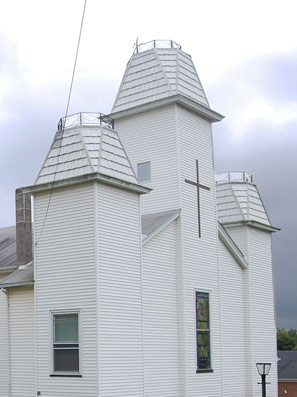
United EFC of Guys Mills, Guys Mills, Pa.
(Photo: Sharon Thompson)
Small Staff
Team
It can be lonely, serving alone at the top without a strong staff team. But when you’re a solo pastor, you have a direct connection to all your members. Sermons can be powerfully aligned with people’s needs and fears and spiritual victories, simply because you know them.
There’s also the ever-present balancing act between lay-leadership-building and “I’ll just take care of this myself.”
“Sometimes in the summer, when the men are in the fields until the dew sets on the grass—which can be 10 at night—I look around and think, I just have to do this because there isn’t anybody else around,” admits Larry Evans.
“But I’m learning to tell myself, Maybe we’ll have to let this wait awhile.”
A temptation for all churches—but perhaps felt most keenly when the congregation is a tiny one—is to squeeze unqualified elders and deacons into those offices in hopes of simply complying with what the church constitution requires.
“I personally believe that God has already given us who we need, to do what He is asking us to do,” says Dave Coddington, pastor of United EFC of Guys Mills (Pa.). “If we can’t find volunteers, maybe the task isn’t all that necessary, maybe we have misread the mission or maybe it’s time to get creative.”
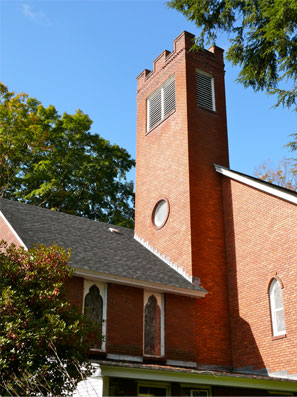
Trinity EFC, Windsor, Vt.
(Photo: Leigh Vincent)
Everybody Knows
Everybody
While the small-town or rural church is chock-full of aunts, uncles and second cousins, take a step back and look around: The entire community is interconnected. There’s no option of living one life in church and another one 30-60 minutes away at work, and yet another at home.
“Our church is in a fishbowl,” agrees Larry Evans. “When I was teaching, some days I would get very frustrated with these kids, and over and over again I’d say, Lord, I have to be careful what I do and say; I don’t want to bring reproach on You and Your kingdom.
“But that isn’t bad. Each of us should walk circumspectly like that.”
Even beyond that natural accountability, there are other benefits to the community connections. “Everyone may not know everyone,” counters Neal Laybourne, pastor of Barre (Vt.) EFC, “but they do know someone who knows whomever you need to know about.
“There is no local news happening that doesn’t directly affect our people. So compassion ministries come more naturally, even if they are mostly informal—reaching one-to-one into the lives of people who surround those directly involved in a tragedy.”
Automatic, without-a-thought compassionate outreach: a natural outflow of the small-town or rural church that’s the envy of those in larger, less-connected communities.
Ministry in small-town and rural America holds pluses and minuses for sure. But don’t believe everything you hear, and don’t be too quick to write off the congregations that make up such a large portion of our EFCA family.
*According to December 2010 EFCA statistics
Blessings in Small Packages
From sea to shining sea, America’s small-town church landscape is dotted with spires, stained glass and ancient pews, as well as brand-new additions and sophisticated sound systems. But it’s not America’s buildings that are her greatest strength. It’s her people.
Life in rural America and in her small towns is different from life in her cities and suburban centers. When daily living has historically been tied to the land, your values reflect that—even if family farms are now a thing of the past.
True, “small town” doesn’t always equal “small church,” nor is the reverse always true. Yet often the two qualities overlap. Despite the fact that 36 percent of EFCA congregations attract fewer than 100 people on a typical weekend*, many of us misunderstand and underappreciate rural and small-town churches.
What some Christian leaders view as ministry “challenges” are regarded as blessings, unique strengths of ministry in rural areas and small town.
Extended Families
The stereotype is true: Everyone in a small church just might be related. “If you want to get married, you have to go out of town to find a spouse,” jokes one small-town pastor.
“If you can keep track of who is related to whom, and make no faux-pas,” adds Judy Brower, director of women’s ministry at Riverview Community Church in Ashland, Neb., “then the fact that one person is reached with the gospel could very well mean that their whole clan will be.”
And if the extended family loves Jesus, it’s an even more powerful network. “A teenager might think that Mom and Dad are out to lunch,” says Karin Taylor, missions and outreach coordinator at Santa Margarita (Calif.) Community Church, “but it is harder to write off multiple generations, especially when you’ve grown up seeing their faith lived out day-to-day.”
Being related to everyone has its downsides too. Tightly connected church members can forget to reach out to newcomers. “And there are a few young adults who might not want to be part of small groups with their parents or parents’ friends—but that doesn’t leave anyone else,” laughs Robert Campbell, pastor of Santa Margarita Community Church.
The commitment to family in a small community also means a commitment to every baseball game, every 4-H show, everything on everybody’s calendar. Without a doubt, time is the most precious commodity in rural and small-town churches. Just as with their larger city cousins.
Bivocational Ministry
In small congregations, pastors and their wives often take second jobs, just like their parishioners. Larry Evans remembers how part-time substitute teaching was the only way to make ends meet in 1994 when he responded to the call to Neal (Kan.) EFC—10 miles from the closest town.
“Frankly, it meant that sometimes, on Saturday nights, I was so tired I could barely put a sermon together,” he admits. “But substitute teaching was a powerful way to establish loving pathways into the community and into the hearts of kids.”
Then there’s Mark Nygard (who might truthfully be called trivocational). When he started pastoring Yegua Creek EFC in Elgin, Texas—on the land his great grandfather donated in 1908 to build the original church—he worked on the side as a cattle-brand inspector and cattle rancher. Then in 2001 he began traveling 175 miles, twice a month, to pastor Melvin EFC.
Although neither church is large (Yegua Creek, 150; Melvin EFC, 20), they are growing each year. “My life is integrated into the members’ lives,” Mark says. “I have also mentored countless people at the cattle auctions. They don’t go to church, but in a sense I am their pastor.
“I’m to the point now where I don’t have to be bivocational. Rather I choose to be bivocational.”
Small Staff Team
It can be lonely, serving alone at the top without a strong staff team. But when you’re a solo pastor, you have a direct connection to all your members. Sermons can be powerfully aligned with people’s needs and fears and spiritual victories, simply because you know them.
There’s also the ever-present balancing act between lay-leadership-building and “I’ll just take care of this myself.”
“Sometimes in the summer, when the men are in the fields until the dew sets on the grass—which can be 10 at night—I look around and think, I just have to do this because there isn’t anybody else around,” admits Larry Evans.
“But I’m learning to tell myself, Maybe we’ll have to let this wait awhile.”
A temptation for all churches—but perhaps felt most keenly when the congregation is a tiny one—is to squeeze unqualified elders and deacons into those offices in hopes of simply complying with what the church constitution requires.
“I personally believe that God has already given us who we need, to do what He is asking us to do,” says Dave Coddington, pastor of United EFC of Guys Mills (Pa.). “If we can’t find volunteers, maybe the task isn’t all that necessary, maybe we have misread the mission or maybe it’s time to get creative.”
Everybody Knows Everybody
While the small-town or rural church is chock-full of aunts, uncles and second cousins, take a step back and look around: The entire community is interconnected. There’s no option of living one life in church and another one 30-60 minutes away at work, and yet another at home.
“Our church is in a fishbowl,” agrees Larry Evans. “When I was teaching, some days I would get very frustrated with these kids, and over and over again I’d say, Lord, I have to be careful what I do and say; I don’t want to bring reproach on You and Your kingdom.
“But that isn’t bad. Each of us should walk circumspectly like that.” Even beyond that natural accountability, there are other benefits to the community connections. “Everyone may not know everyone,” counters Neal Laybourne, pastor of Barre (Vt.) EFC, “but they do know someone who knows whomever you need to know about.
“There is no local news happening that doesn’t directly affect our people. So compassion ministries come more naturally, even if they are mostly informal—reaching one-to-one into the lives of people who surround those directly involved in a tragedy.”
Automatic, without-a-thought compassionate outreach: a natural outflow of the small-town or rural church that’s the envy of those in larger, less-connected communities.
Ministry in small-town and rural America holds pluses and minuses for sure. But don’t believe everything you hear, and don’t be too quick to write off the congregations that make up such a large portion of our EFCA family.
*According to December 2010 EFCA statistics